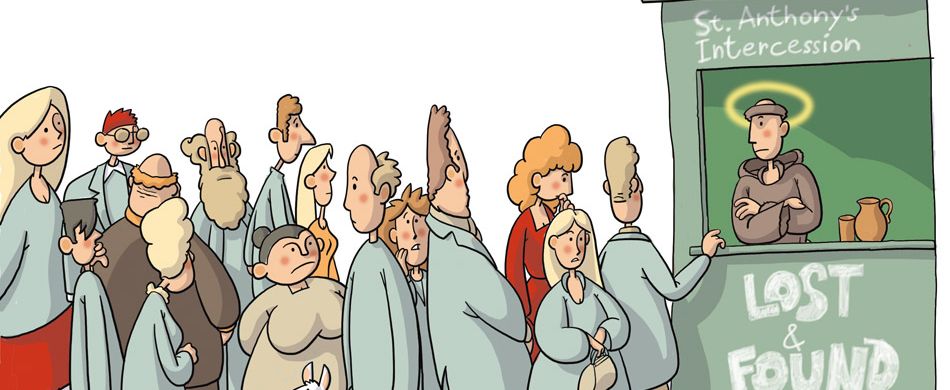SAINT Anthony is, without doubt, one of the most venerated saints in the world, and this is why, at the beginning of the 20th century, Pope Leo XIII called him “the saint of the whole world.” The Pope wanted to underscore the fact that Anthony was not only one of the best loved saint in the world, but that he was even venerated by non-Christians.
However, St Anthony is also universally known as the Saint who helps people find lost items. Even The Catholic Encyclopedia ’s entry on our Saint mentions that “He is specially invoked for the recovery of lost things.” How many of us turn to him when they can’t find their car keys, a letter, or more properly, when they lose their health or their faith?
According to some biographers this patronage stems from a specific episode of the Saint’s life. St Francis founded the Order of the Friars Minor in 1209, and at first he was not very keen on having his friars study. He, in fact, had seen many highly educated clergy and bishops shun the presence of poor people, and he wanted his friars to live among the destitute and to accept a life of poverty.
However, St Francis continued to hear so many glowing reports of Anthony’s sermons, his knowledge of Scripture and his devotion to Mary, that in 1224 he wrote to Anthony: “I, Brother Francis, send wishes of health to Brother Anthony, my Bishop. It pleases me that you teach Sacred Theology to the Brothers, as long as in the words of the rule you ‘do not extinguish the spirit of prayer and devotion’ with study of this kind.” And so Anthony became the first teacher of Theology in the Franciscan Order with St Francis’ special approval and blessings.
One day a novice, one of Anthony’s pupils, realized he had grown tired of the religious life. So he determined to leave the Order, but before doing so he decided to steal the Saint’s Psalter, knowing the book would fetch a high price on the black market. Books in those days were precious because the printing press had not yet been invented, and books had to be painstakingly hand-written. But in the case of that Psalter the price was even higher, because Anthony was already considered a saint.
Our poor Anthony looked everywhere, not only because the book had sentimental value for him, but especially because that Psalter also contained many useful notes for his teaching. Obviously Anthony was not able to find the book, and so he prayed fervently to God for his Psalter to be returned to him. St Anthony’s prayers were eventually answered, and not only did the thief return the book but, repentant, he even rejoined the Franciscan Order!
Over time this story has been changed into slightly different versions, but the central theme has remained the same, and shortly after St Anthony’s death people began praying to him to recover lost items.
A contemporary of St Anthony, named Julian of Speyer, wrote a beautiful hymn about Anthony called Si quaeris after he was canonized. A part of the celebrated hymn contains these words:
The sea obeys and fetters break
and lifeless limbs you do restore
while treasures lost are found again
men young and old your aid implore…
The Si quaeris underscores the fact that neither the forces of nature nor the will of man can prevent anyone’s prayers to St Anthony for a lost object or a loved one from being answered.
One day a devotee of Saint Anthony asked me why such a great saint and Doctor of the Church would busy himself with such a petty task as that of helping people find lost objects. Well, I have no doubts about the answer: during his life St Anthony showed us his humility and enthusiasm in winning souls for God. Now, in helping others find lost items, I’m sure Anthony wants us to understand that nothing is too small or too trivial to lead people to Christ. We should therefore gladly welcome every opportunity – no matter how trifling – that shows us that we are truly God’s children.




